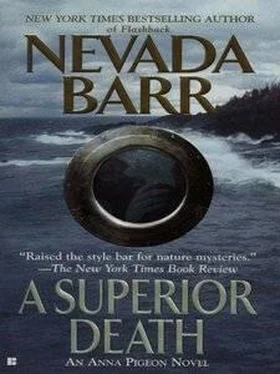Lucas didn’t say anything. He and Anna stood on the deck of the Lorelei watching the white vee-shaped wake plowing a furrow in the lake. Diving gear was stacked against the cabin behind them. Pilcher piloted the boat and Jim Tattinger, ISRO’s Submerged Cultural Resources Specialist, rode inside as was his custom whenever possible. A light drizzle fell from an iron-gray sky hanging low over the lake. There was no wind and the water was flat and dark.
Anna pulled herself deeper inside her Gore-Tex jacket, keeping her back to the wash of air around the cabin. Vega, bareheaded in the rain, his arms crossed over the green bulk of his life preserver, was lost in thought. Lucas Vega was what Anna considered an Old World ranger. He believed in wilderness, in the Park Service, in the sanctity of the NPS credo: “… to conserve the scenery and the natural and historic objects and the wildlife therein and to provide for the enjoyment of the same in such a manner and by such means as will leave them unimpaired for the enjoyment of future generations.” A graduate of Stanford with an advanced degree in archaeology, he worked for peanuts. Lucas Vega also believed in noblesse oblige. He could afford to. Lucas was the only son of a woman who owned seventy-five hundred acres of San Diego County, one of the last existing Spanish land grants in southern California.
“I couldn’t tell who it was either-or if it was an effigy,” Vega said finally. “And I’d hate to guess at this stage of the game. I expect it’s a hoax. Martini’s Law taking effect. A lot of these guys have a sense of humor that’s not of this world. The ecstasy of the deep? Too much weightlessness?”
Anna shrugged. She knew what he meant. Divers, the serious ones with a lot of dives to their credit, had a different way of looking at life. Not as if it were cheap-they strove to stay alive and risked a great deal to keep each other alive- but they seemed to grasp a connectedness that eluded most people, a sense that life and death were two parts of the same whole, like the crests and the valleys of a wave emerging from the same sea.
This realization-if it was a realization-created as many behavior patterns as there were divers; from protective zealots like Denny Castle to hard-living, hard-drinking party divers. The kind who would make a sixty-year-old corpse flip the bird.
The kind who might dress up a mannequin in turn-of-the-century finery and put it in an engine room nearly two hundred feet beneath the water.
“Those Canadians, Jon Diller and Bobo Whatsisname, did they strike you as the type?” Vega’s mind seemed to be following in the same channels as Anna’s.
She shook her head. Wrestling a mannequin down into the Kamloops was dangerous, expensive, and disrespectful-not of human life or human remains but of the lake.
“They seemed fairly legit,” Anna said. “And I doubt they’d have the money for that kind of elaborate joke. Bobo had some expensive equipment but their boat had that repaired and polished look boats get when love and hard work take the place of money.”
“We’ll go back through the permits. Yours, ours, and whatever Windigo’s got. There can’t have been that many divers on that wreck.”
The Kamloops scared off all but the best or the boldest. She was not a casual dive. “Not that kind of girl,” Anna agreed. The corner of the Chief Ranger’s mouth twitched in what might have been a smile.
“This isn’t my favorite dive,” Lucas said. “Too much can go wrong. You get too stupid at six atmospheres. And you’re in too much of a hurry to get home.”
Every fifty feet down hit the human brain like one dry martini-hence Martini’s Law. It had something to do with nitrogen forced into the bloodstream. No one knew exactly how it worked, just as no one knew why laughing gas made people laugh. But two hundred feet down in frigid waters, the lake usually had the last laugh.
“This’ll be a bounce dive,” Lucas went on. “Ralph and I’ll scoot down, look around. Keep our bottom time to the bare minimum. Keep our decompression time on the ascent as short as we safely can. If it turns out I’m risking the lives of two rangers because somebody played a bad joke, we’ll find our jokers and slap them with everything the law will allow, including Piracy on the High Seas and Not Working and Playing Well with Others.”
Anna smiled. Lucas Vega was just the man who could make the charges stick.
“What’s that?” Vega asked suddenly. “There.”
Anna looked where he pointed. Softened by veils of mist, the north shore rose up out of the lake. Cliffs, formed when the island’s bedrock was fractured and tipped to the southeast, showed dark and forbidding. A litter of boulders chewed the waters at their base.
“Down at waterline, among the rocks,” Vega said.
Anna saw what he was looking at then: a boulder, smoother, blacker than the others. As she stared at it she realized it was moving ever so slightly, a barely perceptible bobbing with the breath of the lake.
Anna ducked into the cabin and borrowed Ralph Pilcher’s field glasses. Protocol required she hand them to the Chief Ranger and she did so. He took them without comment, his eyes never leaving the shore.
“It’s a vessel all right. A little runabout. Maybe sixteen, eighteen feet long. Black fiberglass hull, red upholstery. I can’t see the name, but unless there’s another just like it, that’s the Blackduck .” The Blackduck was the Resource Management Department’s boat. They had lent her to Jo Castle for the duration of her research on the island.
“Tell Ralph to change course.” Lucas never altered the tone of his voice, never raised it, but there was that about the man that when he wished to be obeyed instantly, he was. Anna went back into the cabin and pointed the vessel out to the District Ranger. “Shit,” he whispered, cut left throttle and pushed full right to turn the Lorelei more sharply.
Anna rejoined Lucas on deck. He kept the field glasses, giving a running report as they neared the vessel. “She’s not swamped. There’s some water on the seats and the dash from this drizzle but the deck’s not awash. There doesn’t seem to be any damage to the hull. Maybe some scratches where she’s been nudging against the rocks.”
The timbre of the inboards changed as Ralph eased the Lorelei gingerly into the shallower water along the base of the cliff. Anna and Lucas each took a side of the boat and stared intently down at the unrevealing surface for any telltale shadows of submerged snags or boulders.
Ralph cut power completely and the boat drifted slowly forward. “That’s it,” he shouted. “I’m afraid to take her any further in.”
“Close enough,” Lucas replied.
A few yards off the Lorelei’s bow, moving up and down on the Bertram’s fading wake, the Blackduck sat in the water. Her outboard motor made a delicate scritching sound as it scraped against a rock.
Feet on the gunwale, Anna eased around the cabin using the chrome railing on the roof to steady herself. Vega passed her the boat hook and she knelt to fish up the Blackduck’s bow line where it trailed down from the cleat. She pulled it dripping from the shallows and Lucas secured it to the Lorelei’s stern. As Anna worked her way back aft, the Chief Ranger reeled in their catch.
The Blackduck had one full tank of fuel; the other was a quarter full. The engine fired up at a touch of the starter. There was no damage to the hull or the propeller. A complete complement of life jackets was stowed under the pilot’s seat. She appeared simply to have been abandoned, left to drift.
They hooked her to the tow line and Pilcher started back out toward the burial place of the Kamloops . The light-haired mannequin in the engine room no longer seemed a practical joke.
Читать дальше











![Джеймс Чейз - Safer Dead [= Dead Ringer]](/books/430347/dzhejms-chejz-safer-dead-dead-ringer-thumb.webp)
